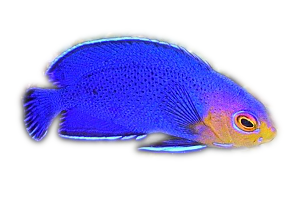
By Bob Goemans

Likely Reef Tank Suitable
Likely Fish-Only Tank Suitable
Range: Indo-West Pacific Ocean
Size: 8 inches (20 cm)
Natural Environment: Inhabits shallow reef areas and seen in caves and crevices during daylight hours and comes out to feed at night.
General Husbandry: Occasionally seen in the home aquarium trade.
Basically stays still, usually under ledges during daylight hours and when evening arrives, begins its search for food, usually algae, yet also tends to be more carnivorous and will include corals, bivalves, gastropods, bryozoans, along with detritus in its diet.
Can maintained in a reef aquarium, yet not without careful observation as to its targeted food preferences. Probably better suited for fish-only aquariums.
Should, when seen moving, be fed small pieces of fish or mussel flesh daily.
Not safe small clams, tubeworms, snails and other small invertebrates.
In aquariums somewhat devoid of algae, small plaster-of-Paris feeding stones that contain seaweed and algae can also sometimes help lengthen lifespans of these urchins in aquariums.
Sheets of Nori weighted down with small rocks may also help keep this species well fed.
Taxonomy:
Kingdom: Animalia
Phylum: Echinodermata
Class: Echinoides
Order: Echinoida
Family: Echinometridae
Genus: Heterocentrotus
FYI: Vulnerable to sudden salinity/specific gravity changes.
Triggerfish and large wrasses will eat these urchins.
Sometimes brown in color.
Experience Level: Intermediate
Diet: Omnivore
Aquarium Environment: Reef or fish-only aquarium
Coral Safe: With caution
Fish Safe: Yes
Invertebrate Safe: With caution
Acclimation Time: Sensitive to specific gravity/salinity changes, therefore be sure to adjust the bag's water to that of the aquarium in which it will be placed by slowly adding small amounts of aquarium water to the bag every few minutes. In most cases, this process should take at least 15 minutes.
Aquarium Hardiness: Moderately hardy
Temperature Range: 72 - 83°F (22 - 28°C)
Minimum Tank Size: 150 gallons
Specific Gravity: 1.023 - 1.025
pH: 8.0 - 8.4
